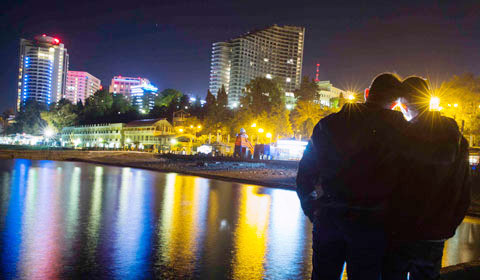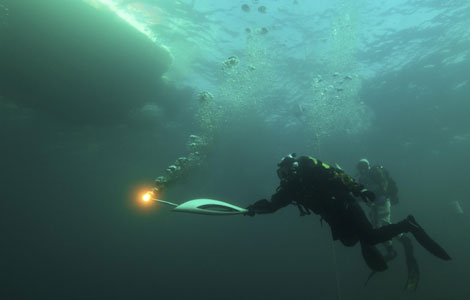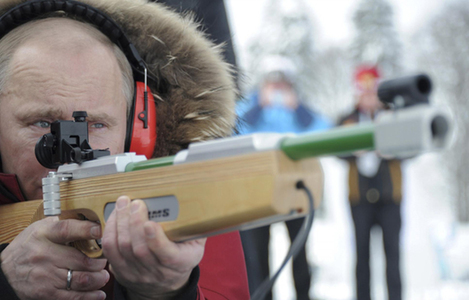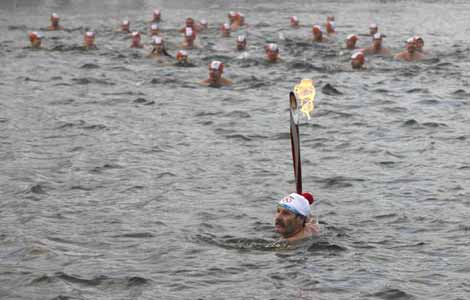Sochi Olympic scene: Busy workers, glitzy venues
Updated: 2014-01-28 16:36:29
()
SOCHI, Russia (AP) _ If you are flying to Sochi for the Winter Games, book a window seat on the right side of the plane. That way you'll get a bird's-eye view of how Russia spent $51 billion on gleaming new sports arenas and a cobweb of highways for this southern city on the Black Sea.
That's the Russia that President Vladimir Putin wants you to see.
Russia's bid to host the 2014 Games, which was championed and overseen in the smallest detail by its powerful leader, is supposed to show Russia as a resurgent economy, capable of turning a semi-obscure seaside resort filled with cheesy bars into an international vacation magnet.
All Sochi needs now is some visitors.
All the indoor venues for the Winter Games are tucked into a compact Olympic park next to the Black Sea. The outdoor venues in the mountains are about 45 minutes away on a brand new squeaky-clean train. Athletes, Olympic delegations, journalists and spectators on the day of the event all have free train tickets.
Visitors to test events that Sochi hosted last year were pleasantly surprised by the army of young volunteers who spoke good English and were eager to help. Expect to see them inside the Olympic bubble as well as at Sochi's upgraded airport and train stations.
Olympic Games these days all have stringent security checks and Sochi even more so since an Islamic insurgency is raging just a few hundred miles (kilometers) away. Railway stations are circled by temporary fencing and all visitors reach venues through a security zone where they face an airport-like body search and an examination of their bags. Trains are patrolled by policemen who walk down the aisles throughout the journey.
The Olympic venues are all built _ some have been operational for a year _ but workers are still busy with finishing touches such as landscaping and road paving. Some of their recent work appears makeshift and hasty: palm trees in the middle of a traffic roundabout were clearly withering away with no grass around them, just fake pine needles.
Despite the last-minute labors, Sochi organizing committee head Dmitry Chernyshenko said Friday that all venues have been tested and are ready to go, according to the R-Sport news agency.
Outside the Olympic bubble, many streets in downtown Sochi are still pot-holed and muddy. A central boardwalk that had almost perfect paving in early December is all dug up _ and it seems workers were removing paving stones to put used slabs back in.
Sochi officials have tried to teach locals some English, but two weeks before the games there were few signs that was working. The city offered language classes for taxi drivers, but none of the ones an AP reporter spoke to went to them or spoke any English.
Beliye Nochi, a legendary Sochi restaurant best known for its khinkali, or Caucasian dumplings, offers an English-language menu with pictures, but the restaurant's staff members acknowledged they are not very fluent. Manager Svetlana Dzhanayeva said she and several waitresses had attended English classes but lamented that they were too brief.
``What can a person learn in three days?'' she said.
Vyacheslav Yakubovsky, a waiter at the nearby Grill&Coffee, said his burger shop was more popular with foreigners, attracting about 30 a day. He went to employer-provided English classes and was confident of his language skills.
Back in 2007, Sochi residents may have greeted the news of the upcoming Olympics with jubilation. Years of enduring Russia's biggest construction project, however, have made them weary.
The billions of Olympic-related rubles poured into Sochi meant huge construction trucks have rattled across its streets around the clock for years, caking mud all over the place. The city is slowly recovering, but its residents still face plenty of challenges.
Yelena Yaroslavskaya, a young mother walking with her baby in a central park, said her apartment block has been hit by recurrent power shortages ever since preparations for the games began.
``We still get power shortages all the time,'' Yaroslavskaya said. ``It's particularly tough when you have a kid and live on the 14th floor. We're tired of the Olympics already.''
Russian officials insist that electricity cuts across Sochi are just part of maintenance work as a new grid is being put into operation. Two power stations and dozens of sub-stations have been commissioned in the past year, but things are not getting easier for Sochi residents just yet.
Other residents were more optimistic, saying the city's massive infrastructure upgrade will be the Winter Games' best legacy.
``I feel better about it now,'' said Irina Kulyabina as she headed off to a management class. ``The highways, the fly-overs, they are gorgeous. You just whizz by.''
Kulyabina said she just had a ``bout of enthusiasm'' about the games that will run from Feb. 7-23.
``I bought the tickets yesterday. My daughter and I are going to see hockey!'' she said.
Photo Gallery
China Daily in Sochi

High stakes for Putin at costly Sochi Games
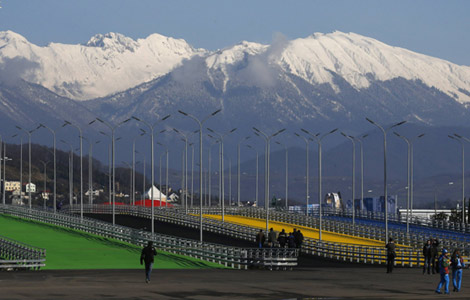
China to send 66 athletes for Sochi Winter Games
Medal Count |
||||
|
1
|
|
1 | 2 | 3 |
|
2
|
|
1 | 2 | 3 |
|
3
|
|
1 | 2 | 3 |
|
4
|
|
1 | 2 | 3 |
|
5
|
|
1 | 2 | 3 |
|
6
|
|
1 | 2 | 3 |

